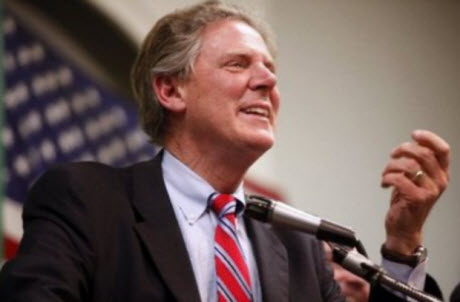FCC IG Agreed to Investigate Pai's Handling of Sinclair-Tribune Merger
The smarter way to stay on top of the multichannel video marketplace. Sign up below.
You are now subscribed
Your newsletter sign-up was successful

The FCC's Inspector General late last year agreed to open an investigation into FCC chair Ajit Pai's handling of the Sinclair Broadcasting-Tribune Media merger and related media ownership deregulatory decisions.
That is according to Rep. Frank Pallone (D-N.J.), ranking member of the House Energy & Commerce Committee, who sought the IG investigation last fall.
Pallone was concerned that Pai had improperly pushed for various deregulatory moves, such as restoring the UHF discount and loosening local ownership restrictions, to benefit Sinclair, whose Tribune purchase was a big beneficiary. He said the IG is also investigating whether the dereg was "coordinated" with Sinclair.
Related | broadcastingcable.com: FCC Seeks More Evidence of Sinclair Deal Claims
Pai has said the review has been by the book, and he has long argued for deregulating broadcasting and that the UHF discount should be looked at in tandem with the 39% ownership cap, including whether an analog discount should replace it, though he has also suggested the UHF discount was an anachronism.
"For months I have been trying to get to the bottom of the allegations about chairman Pai’s relationship with Sinclair Broadcasting,” Pallone said in a statement and to The New York Times, which first reported of his confirmation of the investigation. “I am particularly concerned about reports that Chairman Pai may have coordinated with Sinclair to time a series of Commission actions to benefit the company. I am grateful to the FCC’s Inspector General that he has decided to take up this important investigation.”
Related: Demand Progress Wants FCC IG to Investigate Pai Over Sinclair Deal
FCC spokespeople were not available to comment on the status of that investigation or what the threshold for investigating a complaint is, though the FCC website outlines the factors the IG considers in agreeing to investigate.
Back in November, joined by Overnight and Government Reform Ranking Member Elijah Cummings (D-Md.), Pallone asked FCC inspector general David Hunt to investigate whether Pai had "taken improper actions to benefit Sinclair Broadcast Group."
At the time, an FCC spokesperson called the request part of an effort by Democrats to target Sinclair over its perceived conservative political views, and branded the allegations a baseless attempt to distract from the merits of the deal.
It is something of a chicken and egg issue. Did Pai help Sinclair by deregulating as expected, or did Sinclair anticipate that deregulation and time its Tribune deal to capitalize on it?
Pai's spokesperson said back in November of the request for an investigation: “Unfortunately, this request appears to be part of many Democrats’ attempt to target one particular company because of its perceived political views, an effort that dates all the way back to 2004 when Ranking Member Pallone, Ranking Member Cummings, and other Democrats demanded that the FCC investigate Sinclair based solely on the content of a documentary they didn’t like and that hadn’t even aired. Any claim that chairman Pai is modifying the rules now to benefit one particular company is completely baseless. For many years, chairman Pai has called on the FCC to update its media ownership regulations -- one of which dates back to 1975. The Chairman is sticking to his long-held views, and given the strong case for modernizing these rules, it's not surprising that those who disagree with him would prefer to do whatever they can to distract from the merits of his proposals.”
Related: Wheeler Says FCC Bent Rules to Help Sinclair
Pai has rolled back a number of decisions of his predecessor, Tom Wheeler, that he opposed and criticized at the time they were approved, including 2014 guidance on how the FCC would treat joint sales agreements and sharing arrangements between noncommonly owned stations; restoring the FCC's UHF discount; and two proposals scheduled for a vote this week (Nov. 16) -- potentially eliminating or loosening some media ownership limits, and allowing for the rollout of ATSC 3.0 transmissions. The FCC also recently eliminated the main studio rule, which required broadcasters to maintain a studio in their community of license.
Pallone and Cummings pointed to the timing of decisions that impact Sinclair deals (such as its purchase of Bonten stations) and proposed deals (the Tribune acquisition), and said they wanted some answers.
Meanwhile, the FCC has stopped the informal shot clock on its vetting of the proposed Sinclair-Tribune merger while it awaits action by the Department of Justice. Sinclair has modified the deal in light of the FCC's deregulatory moves and in an effort to retain more stations. Likely if and when Justice signs off on that, or its modification of Sinclair's modification, it will need to be refiled with the FCC and put out for public comment.
The smarter way to stay on top of the multichannel video marketplace. Sign up below.
Contributing editor John Eggerton has been an editor and/or writer on media regulation, legislation and policy for over four decades, including covering the FCC, FTC, Congress, the major media trade associations, and the federal courts. In addition to Multichannel News and Broadcasting + Cable, his work has appeared in Radio World, TV Technology, TV Fax, This Week in Consumer Electronics, Variety and the Encyclopedia Britannica.

